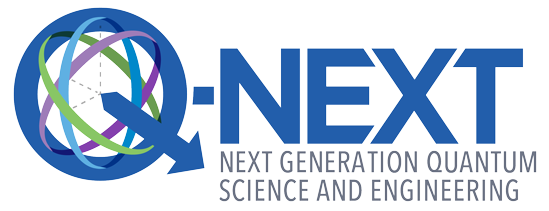Quantum Information Science
For more than a century, scientists have studied these quantum phenomena to better understand nature’s underpinnings. Studies of quantum mechanics eventually enabled the development of revolutionary technologies such as the transistors that power electronics and computers, the ultrasensitive detectors used in medical imaging, and the atomic clocks in GPS satellites.
Researchers continue to turn nature’s quantum properties to practical advantage, opening up completely new ways to collect and process information. Research in quantum information science, known as QIS, is expected to overcome many of the fundamental limitations of our traditional sensing and communications networks, important areas of focus within Q-NEXT. The implications for our economy and nation could be transformational.
Quantum systems could provide perfectly secure communications, novel solutions to highly complex optimization problems in energy, finance and healthcare, more accurate measurements of physical phenomena, better methods of synthesizing new drugs, and far more realistic simulations of the real world.
We are already seeing significant interest arising from the promise of quantum systems to provide:
Encrypted communication channels perfectly secure against hacking. One of the nonintuitive principles of quantum mechanics is that spying on a quantum-encrypted communication causes the communicated information to be corrupted and unreadable. Quantum communication can, therefore, be fundamentally secure in a way that no traditional communication can.
Novel solutions to highly complex optimization problems in areas such as logistics, finance and healthcare, leading for example to better methods of synthesizing new drugs. For some problems, particularly in areas such as cryptanalysis or simulations of the physical world, quantum-based computers will perform calculations much more efficiently and accurately than traditional computers.
Sensors that achieve unprecedented sensitivities and may be used in areas of biological, astronomical, technological and military interest. Developments in quantum sensing will have several applications in quantum computing, including in the use of these sensors as qubits, the basic unit of quantum information.
QIS is a rapidly evolving field, and we expect to identify entirely new applications that benefit people in ways that we could never envision today, just as 100 years ago the pioneers of quantum theory could never have imagined that their work would lead to the technologies we use today. Advances in QIS are likely to vastly improve our lives in the decades ahead.
Quantum information science at the U.S. Department of Energy Office of Science
Quantum information science for everyone - presentations to Congressional staffers
Quantum for the people: connecting quantum information science and society – 2022 AAAS Meeting
